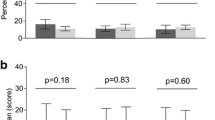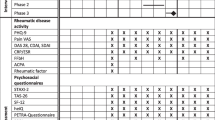Abstract
The significance of evaluations of stressors in rheumatoid arthritis (RA) patients was investigated from the perspective of holistic medicine. The subjects were RA patients treated in the rheumatology outpatient clinic. They included 30 patients from 1987, 30 from 2002, and 137 from 2009. To investigate the specific causes of stress, the patients were asked the question, “What do you feel is your strongest stressor?” The same patients also underwent psychological testing and was examined the disease activity. Pain was the strongest stressor in RA patients in 1987, 2002, and 2009. However, the percentage of patients citing pain as their major stressor was decreasing with each year. CRP was significantly lower in 2009 than in 2002. CRP was also significantly lower in patients who used biologics than in patients who did not. In 2009, DAS28-CRP was significantly higher in patients whose largest stressor was pain than in patients whose largest stressor was another factor. In 2009, the values for both state anxiety and trait anxiety were significantly higher in patients who said that they had stressors than in those who said they did not. The strongest stressor in RA patients was pain. However, the percentage decreased over the years with lower disease activity from advances in therapeutic agents such as biologics. Meanwhile, stressors other than pain were the same or somewhat increased, and they were related to anxiety or depression. Understanding stressors in RA is thus important in treating RA patients.




Similar content being viewed by others
References
Alexander F (1950) Psychosomaic Medicine. WW. Norton and Company, New York, pp 104–106
Malysheva O, Pierer M et al (2010) Stress and rheumatoid arthritis. Z Rheumatol 69:539–543
Suurmeijer TP, Waltz T et al (2001) Quality of life profiles in the first year of rheumatoid arthritis. Arthritis Rheum 45:111–121
Stojanovich L, Marisavljevich D et al (2008) Stress as a trigger of autoimmune disease. Autoimmun Rev 7:209–213
Mahat G (1997) Perceived stressor and coping strategies among individuals with rheumatoid arthritis. J Adv Nurs 25:1144–1150
Meenan RF, Gertman PM et al (1980) Measuring health status in arthritis: the arthritis impact measurement scales. Arthritis Rheum 23:146–152
Meenan RF, Mason JH et al (1992) AIMS2: the content and properties of a revised and expanded arthritis impact measurement scales health status questionnaire. Arthritis Rheum 35:1–10
American Psychiatric Association (1980) Quick reference to the diagnostic criteria from DSM-III. American Psychiatric Publishing, Washington, DC
American Psychiatric Association (1994) Quick reference to the diagnostic criteria from DSM-IV. American Psychiatric Publishing, Washington, DC
Prevoo ML, Van t Hof MA et al (1995) Modified disease activity score that include twenty-eight-joint counts. Development and validation in a prospective longitudinal study of patients with rheumatoid arthritis. Arthritis Rheum 38:44–48
Spielberger CD, Gorsuch RL, Lushene RE (1970) Manual for the State-Trait Anxiety Inventory. Consulting Psychologists Press, Palo Alto
Zung WWK (1965) A self-rating depression scale. Arch Gen Psychiatry 12:63–70
Van Lankveld W, Naring G et al (1993) Stress caused by rheumatoid arthritis: relation among subjective stressor of the disease, disease status and well-being. J Behav Med 16:309–321
Maini RN, Breedveld FC et al (2004) Sustained improvement over 2 years in physical function, structural damage, and signs and symptoms among patients with rheumatoid arthritis treated with infliximab and methotrexate. Arthritis Rheum 50:1051–1065
Goekoop-Ruiterman YPM, De Vries-Bouwstra JK et al (2005) Clinical and radiographic outcome of four different treatment strategies in patients with early rheumatoid arthritis (the Best study). Arthritis Rheum 52:3381–3390
Yocum D, Rahman MV et al (2004) Infliximab rapidly improves all components of physical function assessed by the HAQ in patients with rheumatoid arthritis. Arthritis Rheum 50:118–122
Russell AS (2008) Quality-of-life assessment in rheumatoid arthritis. Pharmacoeconomics 26:831–846
Odegard S, Finset A et al (2007) Pain and psychological health status over a 10-year period in patients with recent onset rheumatoid arthritis. Ann Rheum Dis 66:1195–1201
Zeitlin DJ (1977) Psychological issues in the management of rheumatoid arthritis. Psychosomatics 18:7–14
Conflict of interest
The authors declare that they have no conflict of interest.
Author information
Authors and Affiliations
Corresponding author
Rights and permissions
About this article
Cite this article
Otake, T., Ashihara, M., Nishino, J. et al. Stressors and rheumatoid arthritis: changes in stressors with advances in therapeutic agents. Rheumatol Int 33, 887–891 (2013). https://doi.org/10.1007/s00296-012-2457-6
Received:
Accepted:
Published:
Issue Date:
DOI: https://doi.org/10.1007/s00296-012-2457-6




